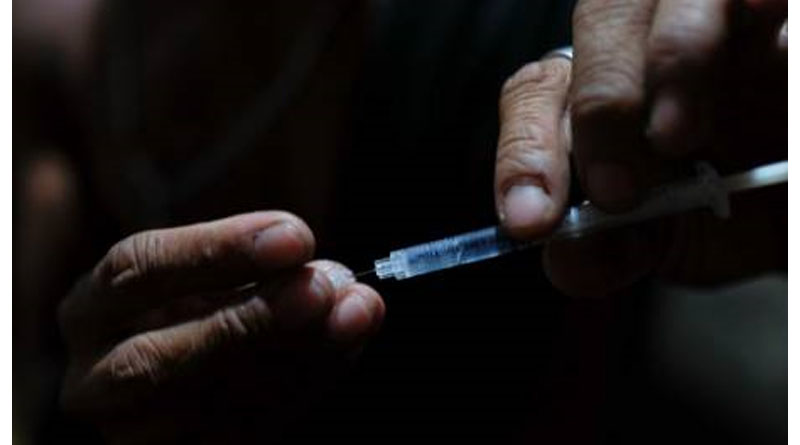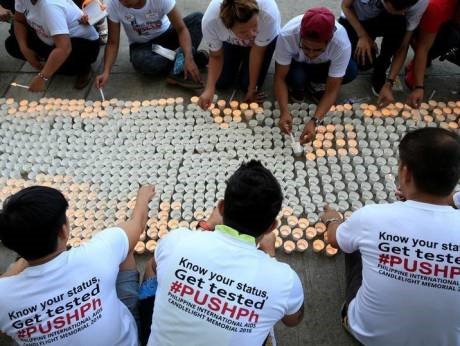Is the Philippines’ ‘War on Drugs’ Fuelling an HIV Epidemic?

Image Caption: Cebu is the city at the Heart of the Philippines’s HIV epidemic.Image Credit: Agency

In Cebu, sharing dirty needles is the main driver for the spike in new HIV cases
Reuters
CEBU, Philippines (Thomson Reuters Foundation) – As Rosita leaves Jose’s small office in downtown Cebu in the central Philippines, he passes her a handful of biscuits and six clean needles. What Jose has just done could land him in jail.
Rosita is a pregnant, HIV-infected injecting drug user – and Jose is a social worker. Amidst Philippines President Rodrigo Duterte’s war on drugs – in which nearly 3,000 people have been killed, according to police – it is safer to be anonymous. Neither wants to give their real name.
Clean needles have been distributed in Cebu City for years, sometimes illegally, in order to prevent the spread of HIV. Under the new government, which took office at the end of June, pressure is increasing for such clandestine activities to stop.
The Philippines has one of the fastest growing HIV/AIDS epidemics in the world, according to the United Nations.
“HIV cases have sharply increased from maybe one new infection a day back in 2007 to what we have now which is more than 24 new cases a day,” said Teresita Bagasao, country manager for UNAIDS in the Philippines.
841 HIV cases in June
The latest Department of Health figures showed there were 841 newly diagnosed HIV cases in the Philippines in June – the biggest monthly total since records began in 1984 and higher than the annual total for 2009.
Most new cases were from sexual contact, particularly among men who have sex with men (MSM), according to the government’s figures, but in Cebu it is sharing dirty needles that is the driver.
Rosita, a former sex worker, explained: “Sometimes my friends don’t have needles so we share.”
Since finding out she had HIV two years ago, Rosita says she has stopped sharing needles but adds that a lack of clean syringes means she is scared more people are going to contract the virus.
Rosita, 35, lives in Kamagayan neighborhood – the historic epicenter of the drugs problem in Cebu, the Philippines’ second city.
In a dark rabbit warren of wood and corrugated iron, the most commonly used drugs – shabu (crystal meth) and nubain (a morphine-like opiate) – are sold in “shooting galleries” for 300 pesos ($6) per syringe.
For those who can’t afford a full syringe, it can be divided between up to 10 people. Prices have almost doubled since Duterte was elected by a landslide in May after vowing to wipe out drugs and crime.
CRACKDOWN
Efforts to protect drug users, including the distribution of clean needles, began in Cebu, particularly in Kamagayan, in 1993 but were halted by city officials in 2009.
“The following year prevalence of HIV amongst people who inject drugs went from less than 0.5 percent to 53 percent,” said Ilya Tac-an, who leads the STD/AIDS detection unit at Cebu City Health Department.
The World Health Organisation says there is “compelling evidence” that needle programs substantially reduce the spread of HIV among injecting drug users without increasing drug use, but in the Philippines possession of “paraphernalia for dangerous drugs” is illegal and carries a prison sentence of between six months to four years.
Since 2009, research programs – under which clean needles can be legally distributed – have been repeatedly given the green light by the Philippines’ Dangerous Drugs Board but then stopped under pressure from anti-drugs groups and politicians.
In 2015, the programs were finally terminated, and under Duterte’s government pressure to not distribute needles has increased.
“It is very hard for us to work with the new administration as they have a very strong program for drugs and there have been a lot of killings going on,” said one healthcare source in Cebu. “They are really quite serious about it.”
Jerson See, founder and president of Cebu Plus, an HIV care organization that has in the past been involved in clean needle programs but does not distribute any more, said the organization was being watched by the government.
“It came to our attention that the name of our organization is already under the radar of the National Bureau of Investigation,” he said.
He urged the government to reconsider its position on needle programs.
“The police and drug enforcement agency’s mandates are a supply and demand reduction program but we just hope the government will reconsider the harm reduction program because it is also a way of halting the spread of HIV,” See said.
Special cases
Jose, the social worker, also says he was “called by Manila” a month ago and advised to stop distributing clean needles. He says he has drastically reduced the amount of needles he hands out.
“In some special cases I hand out needles – when it is really needed such as in the case of a person living with HIV who is in the company of those not living with HIV,” he said.
Cebu Plus and Cebu City Health Department offer other services to people with HIV including counseling and HIV testing, but Dr Tac-an says it is not enough.
“The needle and syringe program was one of getting them (injecting drug users) to come in for the other services,” she said. “We are not really reaching that many injecting drug users (now).”
But not everyone in Cebu is supportive of clean needle initiatives. Alice Uttlang is the head of COSAP, the city government’s Cebu Organisation for Substance Abuse Prevention.
The veterinarian-by-trade was given the COSAP job in 2014 in the office next door to Cebu Plus at a time when clean needles were being distributed as a part of a research program.
“I saw a lot of people outside my office with the typical ‘users’ look,” she said. “I asked myself what these people are doing here, were they lining up to get the syringes?
“Is this not a slap in our face? Our office is here preventing and here they are condoning, even encouraging them to continue to use drugs, to inject drugs, as long as you use a clean syringe.”
Uttlang says some of those getting free needles would go on to sell them. She adds that she would potentially accept a clean needles program as long as there were other conditions, such as police being given data about the locations of drug users.
The Department of Health did not respond to questions on clean needle programs in Cebu, but said it was implementing a “behaviour modification program” which included community members teaching others about the dangers of drugs, as well as HIV testing.
For Jose, the government’s efforts are helping: “Everybody is trying to think of what is best and there is no perfect remedy.”
But he says he will continue to distribute needles in special cases.
“I have a different understanding. Others (the government, churches and NGOs) are doing something good but they are not on the frontline — I know these people.”
(Source: GulfNews.com)



